Isamu Kosugi
Рождение : 1904-02-24, Ishinomaki, Miyagi Prefecture, Japan
Смерть : 1983-04-08
История
Isamu Kosugi (小杉 勇, Kosugi Isamu, 24 February 1904 – 8 April 1983) was a Japanese actor and film director.
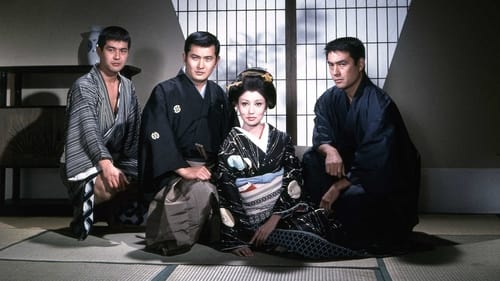
Iwamatsu Koiso
It is the end of the Taisho era (1912-1926), and at the Hanazuki-tei theatre in Asakusa, the famous performance of storyteller Koiso Kikuji and performer Kataoka Koshin is reaching its climax when the Tawaraya family interferes... This is an entertaining action film bursting with righteousness and humanity, centred on men who try to live righteously against a corrupt boss who preys on the performers.

Oba Kumakura
Sangoro Oiwake runs out of money. He visits rice shop, eat and drink for free, and owners send him to prison. In prison Sangoro will have a new life
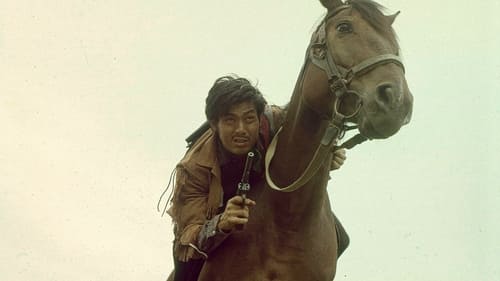
Director
Wearing a symbol of justice and brotherhood on his waist – a crimson pistol belt, Ace Joe engages in a fight with villains trying to seize the mine.

Director
Japanese comedy film.
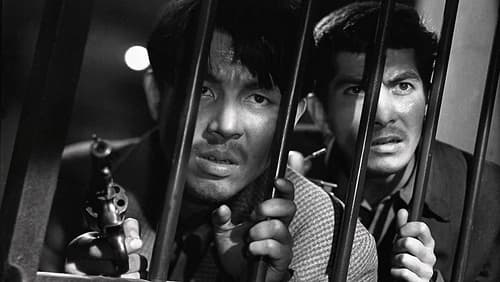
Director
A prisoner escapes from prison to find the real criminal.

Fukazawa, policeman
A prisoner escapes from prison to find the real criminal.

1959 Japanese movie

Director
1959 Japanese movie

Director
Japanese "kayo" film centered around the song "Tokyo gozen sanji" by Frank Nagai.

Shôzô
История нежной любви сына богатого помещика Дзюнкити и дочери лесника Каюки, которые вопреки воле родителей, решили соединить свою судьбу. Ни война, ни годы разлуки не убили эту любовь. Её оборвала лишь трагическая смерть Каюки.

Dr. Shiozawa
По одноименному произведению Ёдзиро Исидзуки. Сюжет основан на тайнах состоятельной семьи Тасиро, в которой воспитывается дочь и два сына. Ни для кого не секрет, что младший сын Синдзи рожден от связи отца семейства с гейшей. Свидетелем семейных драм становится Такако Курамото, которую наняли в качестве репетитора для дочери, которая ещё ходит в школу.
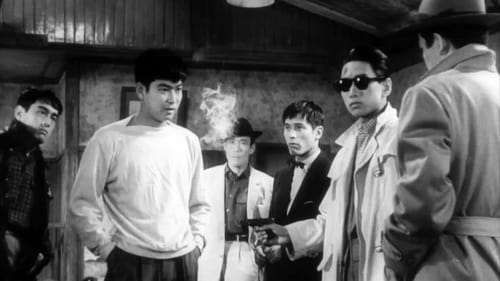
Uchiyama
Главные герои этой криминальной драмы, — Дзёдзи Симаки, бывший боксёр, отстранённый от ринга, ныне владелец небольшого кафе и Саэко, клубная певица, частично потерявшая голос и находящаяся на грани самоубийства. Потерянные души, они встречаются однажды ночью у причала, где она хотела совершить попытку суицида. Дзёдзи приглашает её к себе в кафе. Какое-то время они живут и работают вместе в его заведении. Герой имеет чёткую мечту — уехать к своему брату в Бразилию, а героиня мечтает найти свою любовь. Но тёмное прошлое Саэко не отпускает её, ибо дружки гангстера Сибаты, на которого она раньше работала, уже рядом. Дзёдзи узнаёт, что его брат оказывается не смог добраться до Бразилии, ибо был убит ещё здесь в Японии из-за своих сбережений, на которые он и собирался купить себе ферму на далёком континенте. И к его смерти причастна та же банда гангстеров, что сейчас пытается вернуть себе Саэко, которую он уже успел полюбить. Дзёдзи объявляет войну преступникам.

Tôhô Tani
Kawai Midori's father left the family a long time ago and since her mother passed away, she has taken care of her younger siblings by herself by working with a group of itinerant camellia oil peddlers. While she is In Izu selling camellia oil, she meets a young student, Katō Yutaka, who asks her to let him take her picture. The peddlers also meet a jazz band, and when Midori sings a song, teased by the band's star singer Nanjō Haruo, the band members are enraptured by her beautiful voice. She eventually joins the band and quickly becomes a popular jazz singer.

A narrative depicting the appearance of soldiers scattered in Rabaul during the Pacific War. The original work of Yoshinori Matsuura was dramatized by Toyama Tetsu of “Smuggling of the Body”, also directed by Yutaka Abe, and Shigeyoshi Mine of “Densuke's Propaganda” was in charge of the shooting. The main performers are Michitaro Mizushima of “Smuggling of the Body”, Ryoji Hayama of “The Sorrowful Garden”, Shoji Yasui of “The People of Okino”, Shiro Osaka of “Lonely Man”, “Tetsuji Kawakami Story 16” In addition to Hiroshi Nihonyanagi, Shinsuke Maki, Isamu Kosugi of the "Hunger Soul", Ko Mishima, Satoshi Nishimura, Saburo Hiromatsu, Hiroshi Kondo and others.

Naokichi Shiba
Продолжение фильма «Голодные души» того же года. Оба фильма являются экранизацией романа Фумио Нивы. Рэйко, которая терпит насилие в браке с мужчиной на 23 года старше её, дружит с Маюми, красивой вдовой. Рэйко встречает делового конкурента мужа, молодого способного бизнесмена, и влюбляется в него. Тем временем Маюми вступает в отношения с Симоцумой, другом ее покойного мужа.

Naokichi Shiba
По мотивам одноименного романа Фумио Нивы. Фильм касается необычной для японского кино темы: любовь зрелых людей. Рэйко Сиба 10 лет замужем за богатым бизнесменом, который на 23 года старше её. Она думала, что сможет полюбить его, но оказалась в роли бесплатной служанки, любовницы и секретарши. Её душа погасла, но тут на её пути возникает блестящий и обходительный мужчина Рэцу Татибана.
Муж Маюми Оготи умер 10 лет назад, и теперь она одна ведет весь бизнес и воспитывает двух ранимых подростков. Она не может забыть мужа, хотя подруги советуют ей вновь выйти замуж. Однако возле неё крутится лишь друг покойного мужа, который без ума от Маюми, хотя он женат, и его жена прикована к постели.

A battle for a large sum of money unfolds on the docks near a steel mill in a foggy atmosphere. Manzo, an engineer on the verge of retirement, witnesses two men shooting each other and collapsing on the quay while his assistant Shinsuke is away.

Director
A battle for a large sum of money unfolds on the docks near a steel mill in a foggy atmosphere. Manzo, an engineer on the verge of retirement, witnesses two men shooting each other and collapsing on the quay while his assistant Shinsuke is away.

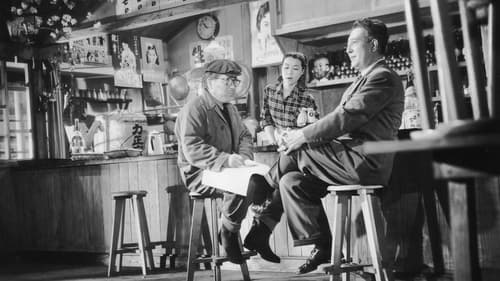
Moichiro Umeda
Takes place in one place, a beer hall, over the course of one evening. Uchida employs this concentration of setting and time to fashion a microcosm for a group portrait of Japan. One by one, the regulars of the bar appear: the pianist who dreams of becoming a composer but has disappeared from the music world after a knifing; a stripper who had planned to be a ballet dancer; an elderly painter trying to make a living at pachinko, and who rues his art having been used for militarist propaganda during the war; a young waitress considering elopement; a colonel turned real estate broker who attempts to rouse the crowd in military song until he realizes the tune has been transformed by marchers in the street into a leftist chant. The "twilight" is more than just a time of day; here, it is a state of being, a suspension between past and present, between the camaraderie of the saloon and the harsh world outside.


Shigeki Kachi, Tosuke Satomura, and Nanako, who belong to the theater company Vuanbert around Dosa, withdrew at the indignation of the chairman Hayashi and seeked their own careers in the film industry.
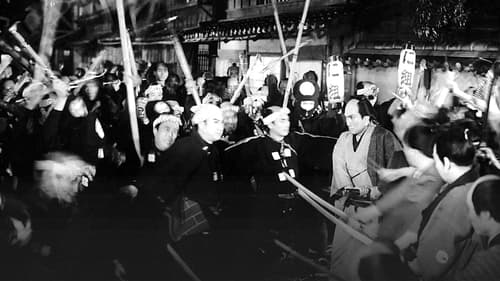
Tetsugorô
A film about the rivalry and friendship between firefighter Chоji and sumo wrestler Sokichi Fudoyama.

Matayoshi Shishido
One Sunday morning, Toshio Esaki, a young dentist, wakes up in his clinic. It seems that he was drunk and spent the night in the clinic instead of going home. When he goes into the laboratory to get a drink of water, he finds a woman wearing a green striped Western-style dress lying there.

Director
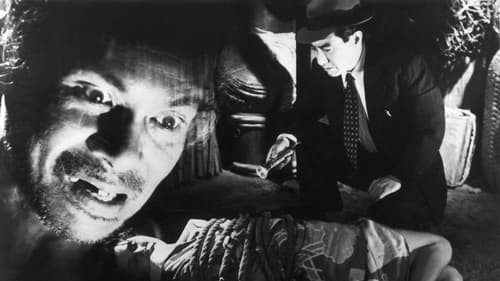
Police Shimizu
Kindaichi challenges the mystery of an incident in which three sisters were killed one after the other according to an ancient tradition on an isolated island in the Seto Inland Sea. Kosuke Kindaichi received a will from his friend Kito, which said, "Go to Gokumon Island to save my three younger sisters," and Kosuke went to Gokumon Island. Upon arriving at the residence of Quito, there were three beautiful sisters, a crazy father, a cousin of Sanae, and Kosuke plunged into a strange atmosphere. The film adaptation of the masterpiece novel of the same name by Seishi Yokomizo. Kyozo Kataoka plays Detective Kosuke Kindaichi, and Ryutaro Otomo plays Inspector Isokawa, who can be called Kindaichi's best partner.

"Delinquent Girl" - A melodramatic love story, a would-be apprenticeship between the titular “bad girl” and the optimistic scholar returning from the big city.

Jida-geki by Santaro Marune.

Kikuoka
Shogi, a Japanese form of chess, is a game that requires skill and determination. When poor sandal-maker Sakata decides to pursue his dream of becoming the Shogi Grand Master Champion, everything is at stake – including his family. What will it cost for Sakata to follow his passion?

Hiroya Yasaka
Простая сентиментальная история о любви, которую Саэко и Синъити должны были сохранить, несмотря на испытания, неодобрение родителей, разлуку и войну.

Based on the comic by Yutaka Asou

Kan'ichi Yamaguchi - captain of Machiho-maru
Waiting woman

Kotobuki-za is a story of the Naniwa-bushi singer Baichuken Tsurumaru.

Okawa
Пестрый коллаж из коротких игровых бытовых зарисовок, документальных кадров и музыкальных номеров. Фильм снят самыми известными кинорежиссерами студии Сётику под патронажем Военного бюро информации за 6 месяцев до поражения Японии в войне.

Mother and younglings
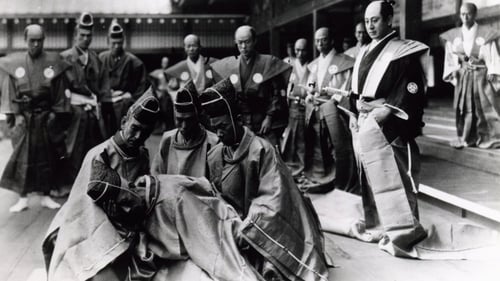
Denpachirô Tamon
В основе картины — популярная легенда о том, как сорок семь самураев сделали харакири, отстаивая честь своего господина.

Ryohei Kubo
Пропагандистский фильм. В этой истории любви юной японской девушки и корейского юноши говорится о том, что молодые люди колониальной Кореи, сменившие корейскую фамилию на японскую, становятся добровольцами армии императора. Корейский режиссёр, чье японское имя Эйтаро Хинацу, снял этот фильм, чтобы подчеркнуть «целостность внутреннего устройства», при котором две этнические группы Кореи и Японии не различают друг друга и хорошо уживаются вместе.

Family of Love
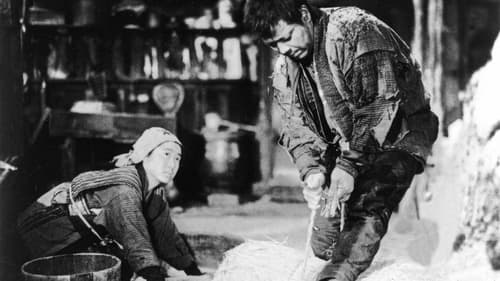
Kanji
Поставленный по одноимённому роману Такаси Нагацука, фильм с глубокой любовью к крестьянину рассказывает о чудовищной эксплуатации , которой подвергают его хозяева земли — феодалы. В центре повествования бедный вдовец-крестьянин Кандзи, который изо всех сил пытается заработать на жизнь для себя и своей дочери, а также выплатить долги своему тестю, которого он ненавидит.

"Around the time he made such remarkably ambivalent war films as Mud and Soldiers and Five Scouts, Tasaka directed this 'home front' comedy-drama which is too bizarre to be serious propaganda. [The plot revolves around a public contribution campaign to buy airplanes.] The mayor's aviator son promises to fly over the village in salute, and much of the narrative concerns the preparations for this great event. Tasaka throws in a few songs, some village humor and satire, and tremendous camera mobility, finally wringing every possible effect from his climax." John Gillett, British Film Institute

A group of Japanese soldiers land in Chinese territory. They advance on a village ; one soldier, Norimoto, is killed in the attack, but the village is captured. Norimoto’s body is recovered and buried. Over the next two days, the soldiers advance inland. Two more soldiers, Naito and Takahashi, are injured. They remain behind to recover, but vow to catch up. Their comrades march on...

После отчаянного боя в роте остается 80 человек из 200. Командир ждет нового приказа о наступлении, и отправляет 5 разведчиков в расположение врага. Они должны вернуться живыми и доставить важные данные.

One of Uchida’s early sound films, Unending Advance is based on a curious story by Yasujiro Ozu, in which an examination of the quotidian problems of a middle-aged salaryman and his family segues into an idyllic dream of an implausible future. The surviving print, although incomplete, offers an essential glimpse into Uchida’s prewar period, when he was associated more with realist dramas than with the period films that dominated his work after the war.

A 1937 Japanese language film directed by Tomu Uchida, starring Ryo Akaboshi, Mitsuru Date and Hisao Furutani.

Teruo Yamato
At the invitation of the Japanese Ministry of Education, the former “mountain filmer” Fanck directed this “cultural feature film” with Japanese actors in Japan, making this the first, German-Japanese co-production. The young Japanese man Teruo gets caught up in a conflict between tradition and modernism, when he returns to Japan from Germany after having spent a number of years there studying. Now, he is supposed to marry Mitsuko, the daughter of his adoptive father, to whom Teruo has long been promised. But Teruo, who has gotten to know the freedoms of the western world, would rather marry the woman he loves and behaves brusquely to Mitsuko.

Film about poet Ishikawa Takuboku

Kentaro's father
Отец, сын Кентаро и дочь Отиё, живущие на берегу реки Сумида, вновь обретают любовь друг к другу после семейного разлада и разлуки. Фильм считается утерянным.
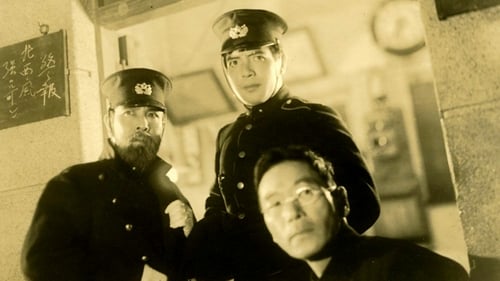
Officer Itami
Itami, a young policeman, meets his high school friend, Tetsuo, a gangster, at a roadblock. As they rekindled their friendship, a complex relationship is established between them.

Higuchi
While returning by boat to Japan, Yoshie Fujiwara meets a rich woman who suggests him to become a singer thanks to an impresario friend of hers.

Daisuke Segi
Сатира на капитализм, в которой рассказывается о молодом человеке по имени Сэки, который поднимается в обществе путём обмана. Но действующая система в конечном итоге ему отомстит. Колоссальная машина современного на тот момент японского общества не настолько проста, чтобы ею мог управлять провинциальный юноша, подобный Сэки. Сэки, считавший себя гением карьеры, является всего лишь современным роботом. Он думал, что дёргает марионеток за ниточки, в действительности же дёргают за ниточки его.

Directed by Kenji Mizoguchi.
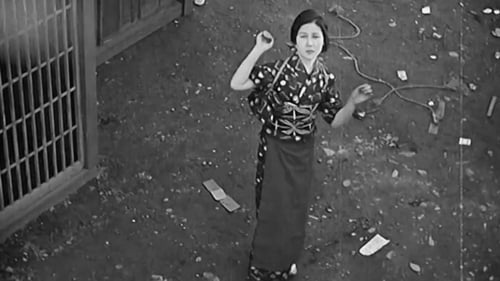
A classic melodramatic love tragedy addressing social inequality in feudal Japan, depicted in Kenji Mizoguchi's typical style. The nostalgic scenes of 1920s Tokyo provides a valuable visual experience set against the background of the title song, "Tokyo March." (Sadly, only 24 minutes of the film now survive.)


































